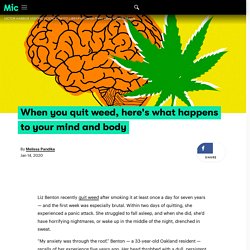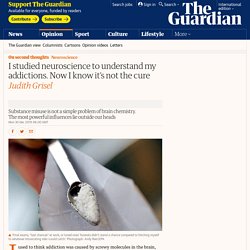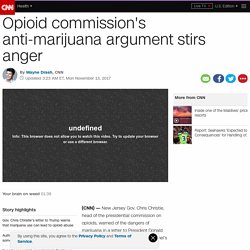

When you quit weed, here's what happens to your mind and body. Liz Benton recently quit weed after smoking it at least once a day for seven years — and the first week was especially brutal.

Within two days of quitting, she experienced a panic attack. She struggled to fall asleep, and when she did, she’d have horrifying nightmares, or wake up in the middle of the night, drenched in sweat. “My anxiety was through the roof,” Benton — a 33-year-old Oakland resident — recalls of her experience five years ago. Her head throbbed with a dull, persistent ache, and her stomach felt queasy. She couldn’t bring herself to eat. Benton may have been experiencing cannabis withdrawal syndrome, which medical professionals are only beginning to understand. “Typically this happens in chronic or heavy cannabis users” — those who imbibe every day, says Yu-Fung Lin, an associate professor at the University of California, Davis who teaches a course on the physiology of cannabis. Quitting weed has its upsides, though. I studied neuroscience to understand my addictions. Now I know it’s not the cure. I used to think addiction was caused by screwy molecules in the brain, and would be cured by neuroscience.

I began learning about how the brain works after I ended up in treatment for drug addiction in the mid-1980s, when hopes for neuroscientific cures were as overblown as the hairstyles. Like many at the time, I envisioned the brain as executive director of an epic drama – solely responsible for the total picture of what I did, felt and thought. My specific purpose in getting a doctorate in behavioural neuroscience was to discover the neural explanation for my irrational choices around mind-altering chemicals. What was the faulty neural switch that swept away heartfelt promises or strongly held convictions in response to practically every opportunity to twist reality? I made increasingly risky and harebrained decisions, as the possibility of transient bliss in a shot of cocaine, a belly full of booze or a head in the (cannabis) clouds came to outweigh my obligations or common sense.
Brain Hacking. Why Pornography Changes the Brain. The Neuroscience of Addiction - with Marc Lewis. Addiction Neuroscience 101. We took a scientific look at whether weed or alcohol is worse for you — and there appears to be a winner. Shutterstock Which is worse for you: weed or whiskey?

It's a tough call, but based on the science, there appears to be a clear winner. Keep in mind that there are dozens of factors to account for, including how the substances affect your heart, brain, and behavior, and how likely you are to get hooked. Time is important, too — while some effects are noticeable immediately, others only begin to shape up after months or years of use. The comparison is slightly unfair for another reason: While scientists have been researching the effects of alcohol for decades, the science of cannabis is a lot murkier due to its mostly illegal status. 30,722 Americans died from alcohol-induced causes in 2014. Gerardo Garcia/Reuters Last year, more than 30,000 people died from alcohol-induced causes in the US — and that does not count drinking-related accidents or homicides.
Meanwhile, no deaths from marijuana overdoses have been reported, according to the DEA. iStock. Opioid panel's anti-marijuana argument stirs anger - CNN. "There is a lack of sophisticated outcome data on dose, potency, and abuse potential for marijuana.

This mirrors the lack of data in the 1990s and early 2000s when opioid prescribing multiplied across health care settings and led to the current epidemic of abuse, misuse and addiction," Christie wrote in the letter, which was released with the commission's final report. "The Commission urges that the same mistake is not made with the uninformed rush to put another drug legally on the market in the midst of an overdose epidemic.
" Ben Carson, the former Republican presidential hopeful and now Cabinet secretary, added to the argument during the final commission meeting, speaking nostalgically of the Reagan-era "This is your brain on drugs" ad campaign and its infamous fried egg imagery. "It frequently starts with something as seemingly innocent as marijuana," said Carson, the secretary of the Department of Housing and Urban Development, who was among several officials to speak at the meeting.